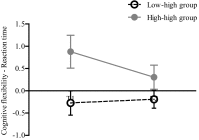Long-Term Follow-Up of Cognition and Mental Health in Adult Phenylketonuria: A PKU-COBESO Study
- PMID: 28776207
- PMCID: PMC5574956
- DOI: 10.1007/s10519-017-9863-1
Long-Term Follow-Up of Cognition and Mental Health in Adult Phenylketonuria: A PKU-COBESO Study
Abstract
Cognitive and mental health problems in individuals with the inherited metabolic disorder phenylketonuria (PKU) have often been associated with metabolic control and its history. For the present study executive functioning (EF) was assessed in 21 PKU patients during childhood (T1, mean age 10.4 years, SD = 2.0) and again in adulthood (T2, mean age 25.8 years, SD = 2.3). At T2 additional assessments of EF in daily life and mental health were performed. Childhood (i.e. 0-12 years) blood phenylalanine was significantly related to cognitive flexibility, executive motor control, EF in daily life and mental health in adulthood (i.e. at T2). Patients with a greater increase in phenylalanine levels after the age of 12 performed more poorly on EF-tasks at T2. Group-based analyses showed that patients with phenylalanine <360 µmol/L in childhood and phenylalanine ≥360 µmol/L from age 13 onwards (n = 11) had better cognitive flexibility and executive motor control than those who had phenylalanine ≥360 µmol/L throughout life (n = 7), supporting the notion that phenylalanine should be below the recommended upper treatment target of 360 µmol/L during childhood for better outcome in adulthood. Despite some results indicating additional influence of phenylalanine levels between 13 and 17 years of age, evidence for a continued influence of phenylalanine levels after childhood on adult outcomes was largely lacking. This may be explained by the fact that the patients in the present study had relatively low phenylalanine levels during childhood (mean: 330 µmol/L, range: 219-581 µmol/L) and thereafter (mean Index of Dietary Control at T2: 464 µmol/L, range: 276-743 µmol/L), which may have buffered against transitory periods of poor metabolic control during adolescence and early adulthood.
Keywords: Adults; Executive functioning; Executive motor control; Longitudinal; Mental health; Phenylketonuria.
Conflict of interest statement
Conflict of interest
R. Jahja has received honoraria as a speaker and consultant for Merck Serono. F. J. van Spronsen was a member of various Scientific Advisory Boards of Merck Serono, is a member of Scientific Advisory Boards of Danone, APR and Biomarin and has received grants for research purpose of both Merck Serono (later Biomarin) and Nutricia. Further he has received consultation fees and speaker relation fees from Merck Serono, Biomarin, Nutricia and Vitaflo. He has assisted in the design of clinical studies using products manufactured by Biomarin. He chairs the Scientific Advisory Board of the ESPKU and is the chairman of the group developing guidelines on PKU in Europe. L. M. J. de Sonneville declares receipt of consultation fees as consultant of Danone, FrieslandCampina, and Global Pharma Consultancy. A. M. Bosch is a member of Scientific Advisory Boards of Merck Serono and Danone, and was also involved in developing guidelines on PKU in Europe. S. C. J. Huijbregts has participated in strategic advisory boards and received honoraria as a consultant and/or speaker for Merck Serono SA, Biomarin, and Nutricia. He is also a member of the group developing guidelines on PKU in Europe. J. J. van der Meere, C. E. M. Hollak, M. E. Rubio-Gozalbo, M. C. G. J. Brouwers, F. C. Hofstede, M. C. de Vries, M. C. H. Janssen, A. T. van der Ploeg, and J. G. Langendonk declare that they have no conflict of interest.
Ethical approval
All procedures performed were in accordance with the ethical standards of the institutional and national research committee and with the 1964 Helsinki Declaration and its later amendments or comparable ethical standards.
Informed consent
Informed consent was obtained from all participants for being included in the study.
Figures


References
-
- Achenbach TM, Rescorla LA. Manual for the ASEBA adult forms & profiles. Burlington: University of Vermont, Research Center for Children, Youth and Families; 2003.
Publication types
MeSH terms
Substances
LinkOut - more resources
Full Text Sources
Other Literature Sources
Medical

